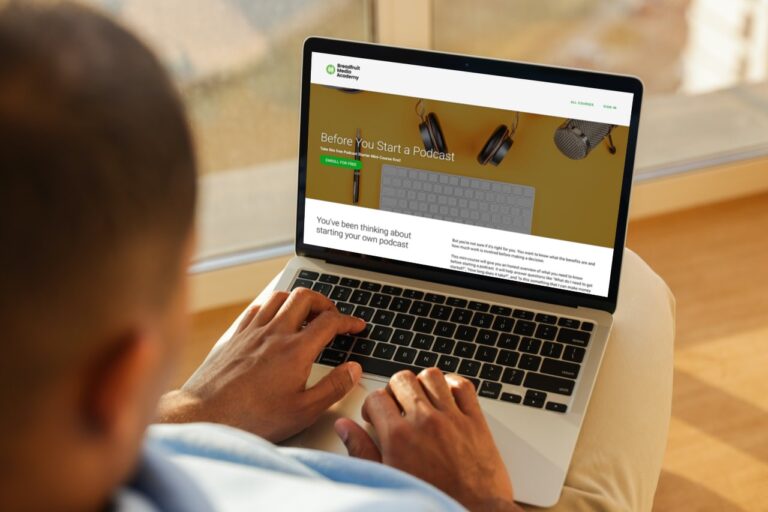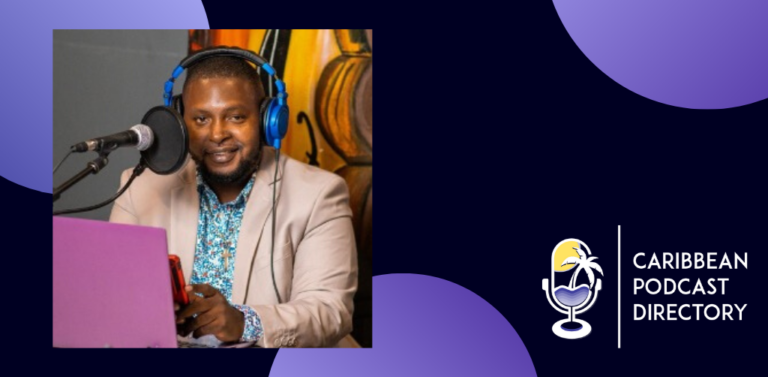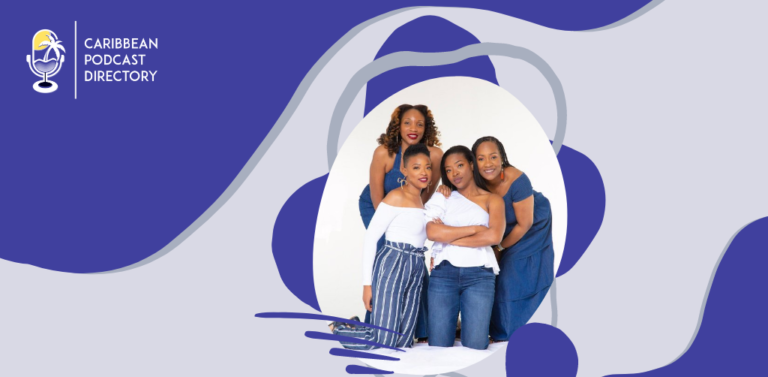Read the French version of the article here.
About the Host – Maëlla Kancel
Maëlla Kancel was born and raised in Guadeloupe. Maëlla also known as Patra M, is the host of Karukerament. She is from Guadeloupe but has lived in and near Paris, France for the last fifteen years. In addition to being a podcast host she is a teacher in elementary school and has been a blogger since 2013.
About the Show
The French version of Karukerament was launched in January 2019 and the English version has been available on Apple Podcasts as of September 2019 under the TV & Film category. New episodes are available on Sundays when the season is running.
Why did you choose this name? What’s the significance?
As someone from Guadeloupe, I’m passionate about trying to understand other people’s culture. It rarely happens the other way around. I chose a name that people from Guadeloupe would recognize right away to let them know it’s for them first. I hoped other Caribbean people would get a sense of familiarity if they knew the original name of their own island.
I also wanted non-Caribbean people to make the conscious effort to research the meaning of the word on their own. If you listen to my episode 1, you’ll know the meaning I give to Karukerament, but I never write it down to let anyone have their own positive interpretation of what it can be. However, let me clarify that it has nothing to do with the word sauerkraut.
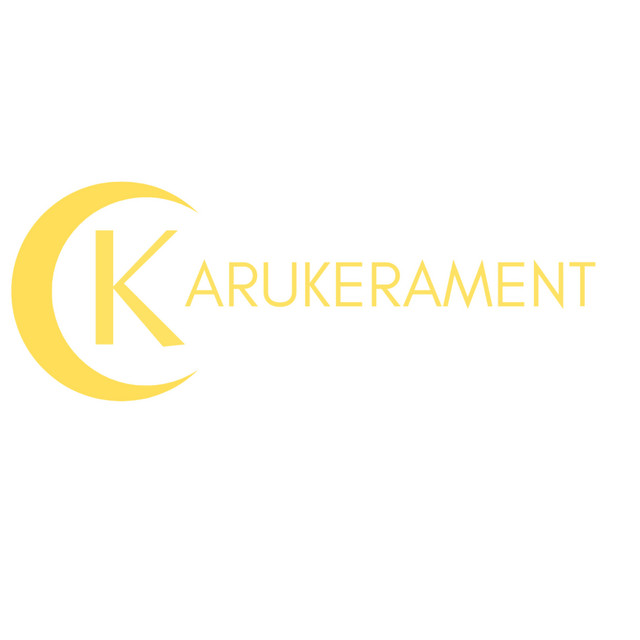
What is the show about?
For now, Karukerament is a podcast about the representation of the Caribbean in cinema and television. I talk about films that help me write my own definition of my Caribbean identity in the 21st century. I read these films and series through the Caribbean connections that I see with my identity as a Black woman, as an Afro Caribbean woman, as a Guadeloupean woman and as a French woman.
Why did you decide to get started in podcasting?
For the same reason I’ve been blogging. I want to connect with people who enjoy things I enjoy. I actually launched my first podcast in 2017, but it was about K-pop and K-dramas. I respect Korean culture, but no matter how much I study the language and the culture, I will never be able to relate completely to what Korean people feel. Talking about Korean culture didn’t bring me as much joy as blogging about Black content did. So when I started watching more and more Caribbean films, I didn’t want to just blog about them. I wanted to express fully my enthusiasm so I created Karukerament.
Why did you choose the topic & format?
Pop culture, French television and at some extent French cinema were already areas of study for my Master’s thesis. But my voice wasn’t heard in the academic world and I don’t think I was ready either to stand strong by what I thought of the lack of representation in French cinema and television. A lot of Caribbean people, especially those in the diaspora and those living in territories that aren’t independent yet, struggle to define themselves in or on their own terms. They’re always too much of this, not enough of that. Cinema is a great outlet to study Caribbean identity and to feel a sense of community.
My format is flexible. Season 1 is made up of 6 episodes posted on a monthly basis. With Season 2, I’m experimenting with a 20-minute weekly episode format. My day job is exhausting, so it’s really about finding the balance with my working schedule. The one constant that I know won’t change for now is that it’s a solo podcast. Karukerament is an intimate journey because I share personal struggles, bad and good memories of growing up and living Caribbean. It is about me challenging myself to be honest with my experiences as a French Afro Caribbean woman. When I am totally at ease with defining my Caribbean identity, the overall format will evolve to bring something new to the table.
You have an English version and French version of the podcast – Why?
I launched the French version first in January 2019 with no intention to do more than 6 episodes. And I even announced that I would stop the podcast after Episode 6 because I had been having a lot of technical issues and the lack of comments made me feel like my work was pointless anyway. I’m not doing this to get people to agree with me or just for the sake of reviewing films. I created this podcast to connect with other people. Since it hadn’t worked in French, I decided to give it another try in English. The English-speaking audience is broader by definition and I was also curious to figure out the similarities and the differences in our perception of the Caribbean culture.
I do my own translation for both versions and I’d say that 95% of the English version is identical to the French version. The 5% of differences comes from how much details I’d get into to contextualize a cultural reference. Like if I speak about J’ouvert or a dancehall artist, my explanations in English will be more concise compared to my French explanation. Whereas if I have to explain something about Guadeloupean culture, I’ll be more concise in French than in English. But overall, the fact that I’m talking about Caribbean culture means that there’s no need for me to change my content because I’m talking to other Caribbean people first, I just switch the language. I do think I’m more straightforward in English when it comes to sensitive issues such as the representation of slavery or racism. France is in denial when it comes to these matters.

What has been the reception since you’ve launched the show?
The reception was a bit… okay, very underwhelming at first. It’s not that much about the streaming numbers, I know what I do is for a niche audience. But a small audience doesn’t mean it can’t be “loud”. I’m a passionate person, I grew up with the online fandom culture. When I like something, I’m very vocal about it. However, Guadeloupean and Caribbean people at large don’t operate that way at all when it comes to celebrating their own culture. I believe there are historical reasons for it, but I won’t get into that here. I know my Season 1 format also played a role in what I thought was a lack of response back then.
One year and six months in, I’ve received one comment for the English version, and like maybe 6 or 7 for the French version? All positive. And I have yet to receive a negative comment. I think reaching 100 followers on Twitter and Instagram changed my mindset and opened my eyes to the quiet but quality support Karukerament gets.
Filmmakers I talk about usually support the podcast, even when I don’t agree with some of their film making choices. They repost their episode on their social media every time I tag them and whenever I request a written interview for karukerament.com, they’ve all but one said yes so far. So it’s very humbling to see how serious they take my work although I’m still new to the game and I’m still building my niche audience. People willing to get their timeline filled with random posts in a language they don’t speak or with the same post several times in a different language, is truly support. Once people join Karukerament, they usually stay and I thank them for their loyalty.
Now that you’ve launched your show, what are you hoping to accomplish?
On a personal level, I hope this podcast will be a testimony on the complexity of our Caribbean identity. There isn’t one definition. Each experience is legitimate.
Now, on a business level, I hope this podcast will help bring more visibility to Caribbean films and their potential to turn into an industry as powerful as Hollywood or Bollywood. As someone who helped spreading the Hallyu (the Korean Wave) in France, I know the power that consumers hold and what a small community of enthusiasts can do to change a national cultural landscape in 5 years. From my point of view, regardless of the politics and the economy, Cariwood could happen in less than 15 years. Clearly, we have quality content… I’d even dare to say that quality is no longer relevant to this discussion. What’s relevant is that Caribbean culture is already international. What’s relevant is that we have professionals in every area of filmmaking and they already try to collaborate together. What’s relevant is how we, as Caribbean consumers, are spread all around the world. Therefore, we play a role into creating this visibility that will bring in the money investment to develop the proper economic system to create more projects.
For the past 30 years, film professionals have been steadily preparing the framework for Cariwood to happen. The consumer role is crucial now more than ever. Needless to say, I extend this reasoning to Caribbean music. That’s why I’m pushing for the use of the hashtag #streamcaribbean to support Caribbean artists.
Who is your dream guest for the podcast?
If I go with a discussion format, I think I’d say director Euzhan Palcy for cinema, Gisèle Pineau for literature and Kassav for music. Not just because I’m a fan, but because I have yet to read or watch an interview of them talking about their Caribbean identity in a Caribbean context. They would probably give us some essential clues on what’s needed for the upcoming Caribbean generations to keep moving forward. If I were to have a guest of my own generation, I’d say Amanda Seales, Rihanna and Stefon Bristol after his 3rd film. Again, I’d discuss about their Caribbean identity and their take on what their achievements did for Caribbean culture.

Podcast Experience
What’s one tip you learned before you started podcasting that was really helpful?
Thanks to my K-pop fan days, I already had video subbing and video editing skills. It made editing audio easier.
What’s one thing you wish you knew before starting your podcast? Or one resource you wish you had before launching?
How to get the right equipment. As a podcast listener, I know I don’t care that much about the audio quality as long as the content is good. Still, a good mic can make the listening experience more enjoyable. And as a podcaster, I do think it’s my duty to create that comfortable space. However I’m not as patient as I used to be in my 20’s to read pages and pages of tutorials or reviews to figure out the equipment that would be the most suitable and affordable for me. I am working on it, though.
What’s one thing you’ve learned about yourself or your audience since you started?
The pressure to post on a regular basis is real, regardless if I do monthly episodes or weekly episodes. I handle it better than I expected and I learned that my audience is quiet but loyal.
Describe your experience podcasting. What resources are available? What could enhance the podcasting experience?
Podcasting helps me overcome what I can now refer to as my university trauma. My college experience was me dealing with people telling me that my thoughts and my words didn’t matter because I’m from Guadeloupe. I am more confident when I speak about Caribbean culture now.
The creation of the Caribbean Podcast Directory was, in my opinion, the latest essential resource for Caribbean podcasting at this point of time. We have somewhere to regroup and know about each other to share tips and get inspired. But there’s a need to have diversity in Caribbean podcast communities. In my case, I wish I had some kind of blueprint on how to handle a multilingual podcast and how to monetize a podcast like mine. Just in general, I think the biggest challenge for us is to turn our strong points – such as storytelling, speaking talking skills, multilingual environment and rich history into a system to develop the regional market and to stand united on the international market.
What’s 1 benefit and 1 challenge of having the podcast in 2 different languages?
One benefit is to learn about different Caribbean cultures and to reach a broader audience. The challenge for me is to speak English. I’m always worrying about my pronunciation. Recording is a stressful moment for me, but it’s worth it.
Who or what has influenced/inspired you the most to start a podcast?
My need to talk about what I love. And I felt like blogging wasn’t enough. If I write, I can’t squeal about a dreamy character like Richard in “The Sweetest Mango” or I can’t rant on and on about what I find annoying in a film like “Guava Island”.
What’s the first podcast you ever listened to?
I think it was Small Doses with Amanda Seales? I was really into the solo format she used to do up until last year.
Other than your show, what are some of your favorite podcasts?
Okay, fangirl mode activated.
- The ones that makes me anticipate their new episode each week: Fanm on Films, The Micheaux Mission and the SoulBack R&B Podcast.
- The ones I like to binge listen: The Write Women Podcast, the Caribbean Millennials, Like A Real Book Club.
- The storytellers/fictional stories: Bronzeville, Passing Through and Harlem Queen.
What do you enjoy most about podcasting?
Talking about my culture without having judgements passed on me. Once the episode is out, people are free to receive it the way they want to.
What do you enjoy least about podcasting?
I don’t like the audio editing process that much, but my least favorite thing is marketing: creating visuals, posting on social media etc. I can’t afford to pay someone to do it for me, so I still do everything for now.
What Advice would you give to other Aspiring Podcasters in the Region or Generally?
Let me just say the traditional but very true advice; be sure of why you want to get into podcasting because this is what keeps you motivated when things won’t go the way you want to. Always keep in mind that your Caribbean background is a big and unique asset. Invest in good equipment and try to find ways to connect with your Caribbean multilingual audience.

Fun Questions
What is the one thing from Caribbean Culture that you cannot do without?
It is a tie between food and art… I’ll go with food. When we’re abroad on vacation, finding food we truly enjoy is HARD. We usually end up going with the basics: sandwiches or go to McDonald’s. We didn’t have to worry about food when we visited Miami. We ate Haitian and Cuban food every day. We felt at home.
Share a Fun Fact about Yourself
I’ve been fluent in English for about 20 years now, but my trip to Miami in 2019 was my first time ever in a city of an English-speaking country. It turns out that my beginner level Spanish and Kréyol skills were more helpful sometimes.
Conclusion
Where do you see yourself in the next 6 months to a year?
Six months from now, I hope my season 3 will be ready in both languages, so I can post them simultaneously on a regular basis while working on the other original content I have in mind. Podcasting is just the stepping stone for everything I want to accomplish.
Where can the listeners find you? Website, contact info, social media etc.
Karukerament and Karukerament English Version are available on Apple Podcasts, Spotify and Anchor.
To read my literature, music and film reviews, you can check out karukerament.com. The site also has its English version.
You can contact me through my email at karukerament@gmail.com. I’m also on Twitter and Instagram @karukerament. I’m hoping to release my first novella in French and English in 2021. Make sure to subscribe to my newsletter to get a monthly update on all my projects! Thank you!
Read the French version of the article here.


